It's all about the classical music composers and their works from the last 400 years and much more about music. Hier erfahren Sie alles über die klassischen Komponisten und ihre Meisterwerke der letzten vierhundert Jahre und vieles mehr über Klassische Musik.
Total Pageviews
Friday, April 24, 2015
Carl Zeller - His Music and His Life
Wednesday, July 2, 2014
Joseph Haydn - His Music and His Life
The turning point in Haydn's fortunes came in 1761, when he was appointed assistant music director to Prince Pal Antál Esterházy; he became full director, or Kapellmeister, in 1762. Haydn served under the patronage of three successive princes of the Esterházy family. The second of these, Pal Antál's brother, Prince Miklós Jozsef Esterházy, was an ardent, cultivated music lover. At Esterháza, his vast summer estate, Prince Miklós could boast a musical establishment second to none, the management of which made immense demands on its director. In addition to the symphonies, operas, marionette operettas, masses, chamber pieces, and dance music that Haydn was expected to compose for the prince's entertainment, he was required to rehearse and conduct performances of his own and others' works, coach singers, maintain the instrument collection and music library, perform as organist, violist, and violinist when needed, and settle disputes among the musicians in his charge. Although he frequently regretted the burdens of his job and the isolation of Esterháza, Haydn's position was enviable by 18th-century standards. One remarkable aspect of his contract after 1779 was the freedom to sell his music to publishers and to accept commissions. As a result, much of Haydn's work in the 1780s reached beyond the guests at Esterháza to a far wider audience, and his fame spread accordingly.
After the death of Prince Miklós in 1790, his son, Prince Antál, greatly reduced the Esterházy musical establishment. Although Haydn retained his title of Kapellmeister, he was at last free to travel beyond the environs of Vienna. The enterprising British violinist and impresario Johann Peter Salomon lost no time in engaging the composer for his concert series in London. Haydn's two trips to England for these concerts, in 1791-92 and 1794-95, were the occasion of the huge success of his last symphonies. Known as the "Salomon" or "London" symphonies, they include several of his most popular works: "Surprise" (#94), "Military" (#100), "Clock" (#101), "Drum Roll" (#103), and "London" (#104).
In his late years in Vienna, Haydn turned to writing masses and composed his great oratorios, The Creation (1798) and The Seasons (1801). From this period also comes his Emperor's Hymn (1797), which later became the Austrian national anthem. He died in Vienna, on May 31, 1809, a famous and wealthy man.
Haydn was prolific in nearly all genres, vocal and instrumental, sacred and secular. Many of his works were unknown beyond the walls of Esterháza, most notably the 125 trios and other assorted pieces featuring the baryton, a hybrid string instrument played by Prince Miklós. Most of Haydn's 19 operas and marionette operettas were written to accommodate the talents of the Esterháza company as well as the tastes of his prince. Haydn freely admitted the superiority of the operas of his young friend Wolfgang Amadeus Mozart. In other categories, however, his works circulated widely, and his influence was profound. The 107 symphonies and 68 string quartets that span his career are proof of his ever-fresh approach to thematic materials and form, as well as of his mastery of instrumentation. His 62 piano sonatas and 43 piano trios document a growth from the easy elegance suitable for the home music making of amateurs to the public virtuosity of his late works.
Haydn's productivity is matched by his inexhaustible originality. His manner of turning a simple tune or motive into unexpectedly complex developments was admired by his contemporaries as innovative. Dramatic surprise, often turned to humorous effect, is characteristic of his style, as is a fondness for folkloric melodies. A writer of Haydn's day described the special appeal of his music as "popular artistry", and indeed his balance of directness and bold experiment transformed instrumental expression in the 18th century.
Monday, June 23, 2014
Anton von Webern - His Music and His Life
Friday, May 16, 2014
Carl Michael Ziehrer - His Music and His Life
Ziehrer lived long enough to experience the Austrian monarchy decline. His life ended up in poverty. Out of his 600 (!) dance compositions remained only a few, such as "Weaner Madlin" ("Viennese Girls").
Out of his 22 operettas only one remained as uncertain success: "Die Landstreicher" ("The Hobos", 1899).
Carl Michael Ziehrer passed away in Vienna on November 14, 1922.
Thursday, March 27, 2014
Joseph Lanner - His Music and His Life
Tuesday, July 23, 2013
Anton Brucker - His Music and His Life
The premiere of Bruckner's 9th symphony was 1903 (after his death on October 11, 1896 in Vienna), "dedicated to our Beloved Lord".
“It is to God that I must give account”
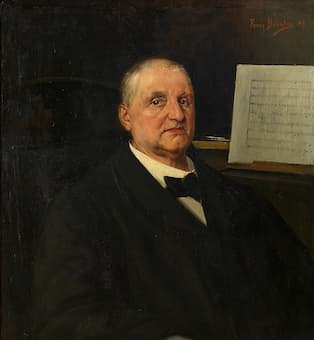
Anton Bruckner, 1889
125 years ago, on 11 October 1896, Anton Bruckner (1824-1896) died from acute heart disease brought on by persistent alcoholism. His funeral took place in the Karlskirche in Vienna on 14 October, and his remains were transferred to the crypt in the monastery of St. Florian near Linz, Austria. Even after his death, Bruckner took center stage in the cultural wars of late 19th-century Vienna. “Admirers described him as an unpretentious, modest man and a daring innovator who shied away from no enterprise.” While his detractors did recognize his originality, “they found nothing of value in the work of a modest Viennese church musician who lived a solitary dreamlike existence without ambition and who had been dragged into the limelight by an excessive Wagnerian cult.” Today, Bruckner is primarily remembered for his symphonies and sacred compositions, and as the “master-builder of cathedrals in sound,” we recognize him as a composer having exerted a lasting and crucial influence on the works of Gustav Mahler. Son of a schoolmaster and church organist, Bruckner was born in the village of Ansfelden—near the city of Linz—on 4 September 1824. The eldest of 11 children, he was admitted to the Augustinian monastery of St. Florian as a chorister, where he participated in its rich musical activities.
St. Florian not only imparted a solid musical education, it also firmly established his devotion to Roman Catholicism. Throughout his life, Bruckner was a devoutly religious man who kept a log of his daily devotions, and prayed before each performance. He is even thought to have experienced religious visions. It is said “there is no composer in the 19th century who was rooted so firmly in a lived, heart-deep devoutness, to whom prayer, confession, sacrament, and profession were vital elements.” His faith in the spiritual journey towards the afterlife became a process that decisively shaped his compositional imagination as he channeled profound spiritual messages that elevated music to the level of an undistracted prayer. His initial career path, however, had nothing to do with music, as he became a teaching assistant in Windhaag near Freistadt. An additional teaching appointment saw him at Kronstorf an der Enns, but eventually he returned to St. Florian for 10 years to work as a teacher and an organist.
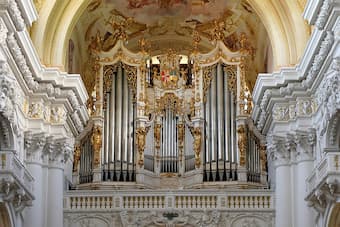
St. Florian Monastery Bruckner Organ
As a composer, Bruckner was largely self-taught and only started to composing seriously at age 37. He took composition lessons from the German cellist and conductor Otto Kitzler, who introduced him to the music of Richard Wagner. He also became a student of the famous Vienna music theorist Simon Sechter, who instructed him in music theory and counterpoint.
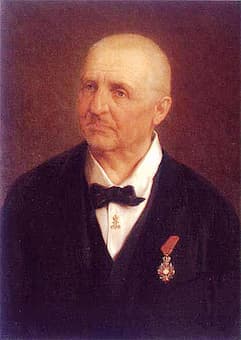
Anton Bruckner
When Sechter died in 1868, Bruckner reluctantly took up the appointment of professor of harmony and counterpoint at the Vienna Conservatory, and subsequently as the Emperor’s court organist. His complete admiration for Richard Wagner elicited deep-seated resentment within Vienna’s musical and critical circles, and for a while, the Vienna Philharmonic Orchestra refused to perform his works. Habitually plagued by debilitating periods of low self-esteem, Bruckner was ill prepared for the acidic and highly competitive musical environment of imperial Vienna. He presented a wide and easy target for music critics, journalists and composers alike. Bruckner’s highly idiosyncratic and expansive musical style was mercilessly criticized, with a critic claiming, “Bruckner simply composes like a drunkard!”
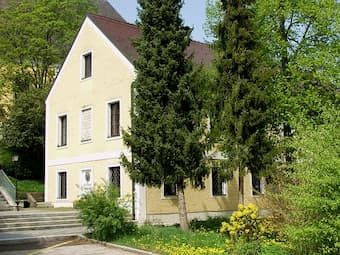
Anton-Bruckner-Museum
Given such harsh professional assessments, it is not surprising that Bruckner was prone to suffer from devastating insecurities that made him endlessly revise and correct his compositions. He allowed outside influences to shape the content of his music and relied for editorial assistance on a number of former students. Their “authorized” involvement with his scores has become one the thorniest issues to haunt the composer’s legacy. Bruckner never felt at home in Vienna. He retained his peasant speech and social clumsiness throughout, and had the disastrous inclination to fall in love with teenage girls. His distracting compulsions ranged from obsessive preoccupation with financial security to a morbid fascination with corpses. Bruckner was painfully unaware of the intellectual and political currents of his day, and he exhibited a “Neanderthal male chauvinism that even his admirers found remarkable.”
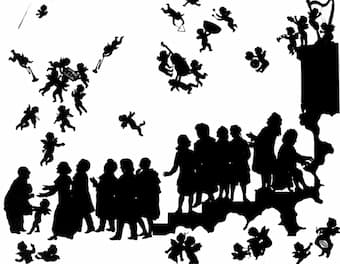
Otto Böhler: Anton Bruckner arrives in heaven
Bruckner composed music that was simultaneously naïve and complex. Yet, once he had found his compositional path, the musical world did not know what to do with it. The conductor Wilhelm Furtwängler pointedly stated, “Bruckner did not work for the present. In his art he thought only of eternity and he created for eternity. In this way he became the most misunderstood of the great musicians… Bruckner is one of those geniuses who have appeared but seldom in the course of European history, whose destiny it was to render the transcendent real and to attract, even to compel, the element of the divine into our human world.”







